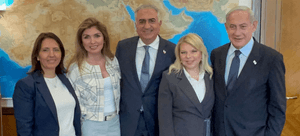
In the wake of a potential regime change in Iran that advocates for a return to a secular and democratic system, the intricate dynamics between Iran and Israel stand on the brink of transformation. The outcomes of these shifts are a subject of ongoing assessment. Notably, during a recent visit to Israel, Crown Prince Reza Shah, a key figure in Iran's opposition, hinted at the prospect of resurrecting consular and economic ties reminiscent of the 1960s and 1970s.
Anticipating Potential Scenarios:
Diplomatic Dialogue:
A transition to a secular government in Iran could usher in an era of diplomatic dialogue with Israel. Such a transformation might involve a trajectory towards normalized relations, fostering increased avenues of communication.
Mitigated Hostility:
The transition to a secular regime will lead to a decrease in anti-Israel rhetoric and policies. A more conciliatory approach from Iran could alleviate tensions, paving the way for a stable regional environment.
Collaborative Pursuits:
Iran and Israel both share concerns related to regional stability, terrorism, and extremism. A regime change could unlock opportunities for discreet collaboration in areas of mutual interest, such as tackling shared threats.
Economic Synergy:
A positive shift in relations could stimulate economic collaboration, delivering mutual benefits to both nations. Trade, investments, and joint projects could flourish under a more reconciliatory Iranian leadership.
Humanitarian and Cultural Bonds:
A regime transition might inspire cultural and humanitarian exchanges, fostering deeper mutual understanding between the people of Iran and Israel. Such interactions could contribute to people-to-people diplomacy and enhance public perceptions.
Reshaping Regional Dynamics:
A recalibration of Iran's stance could ripple through the broader regional power dynamics. Strengthened ties with Israel might influence the behavior of Iran's regional allies and proxies, potentially altering conflicts in the Middle East.
Challenges on the Horizon:
While a regime change presents new possibilities, it is essential to acknowledge that deeply entrenched historical, ideological, and geopolitical factors won't dissipate immediately. Efforts towards reconciliation could encounter resistance from various quarters within both countries and from regional actors.
International Responses:
The international community will closely monitor and respond to any shifts in the Iran-Israel relationship. Key players, global powers, and international organizations like the United Nations could play pivotal roles in either facilitating or obstructing progress.
In Conclusion:
The potential for a regime change in Iran holds significant implications for the nation's interactions with Israel. Although prospects for improvements exist, successfully navigating these changes necessitates meticulous diplomacy, astute consideration of regional intricacies, and a sensitive approach to addressing historical grievances. The choices made by a new Iranian leadership will sculpt the trajectory of the relationship, impacting not only bilateral dynamics but also shaping the broader geopolitical landscape of the Middle East.






